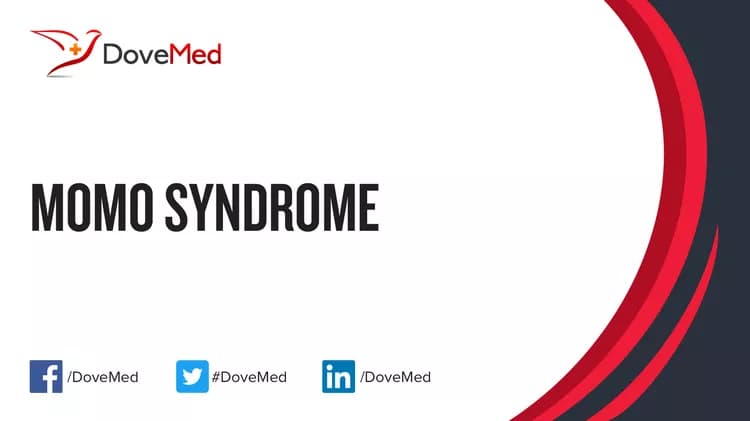What are the other Names for this Condition? (Also known as/Synonyms)
- Macrocrania, Obesity, Ocular Abnormalities (Retinal Coloboma and Nystagmus)
- Macrosomia, Obesity, Macrocephaly, Ocular Abnormalities
What is MOMO Syndrome? (Definition/Background Information)
- MOMO Syndrome is a rare syndrome that was named for the characteristics of Macrocephaly, Obesity, Macrosomia, and Ocular anomalies that were present in the individual's first reported
- It has also been proposed that the acronym stand for Macrocephaly, Obesity, Mental (intellectual) disability, and Ocular abnormalities because overgrowth (macrosomia) did not appear to be a feature in all affected individuals
- The most common features that have been reported include generalized obesity starting from early childhood; macrocephaly; ocular abnormalities (especially retinal or choroid coloboma); delayed bone age; and intellectual disability
- It is thought to be caused by a new (de novo) autosomal dominant mutation, although this remains unclear
(Source: MOMO Syndrome;Genetic and Rare Diseases Information Center (GARD) of National Center for Advancing Translational Sciences (NCATS), USA.)
Who gets MOMO Syndrome? (Age and Sex Distribution)
- MOMO Syndrome is a rare congenital disorder. The onset of symptoms is noted in young children
- Both males and females may be affected
- Worldwide, individuals of all racial and ethnic groups may be affected
What are the Risk Factors for MOMO Syndrome? (Predisposing Factors)
- A positive family history may be an important risk factor, since MOMO Syndrome is believed to be an inherited condition
- Currently, no other risk factors have been clearly identified for MOMO Syndrome
It is important to note that having a risk factor does not mean that one will get the condition. A risk factor increases one’s chances of getting a condition compared to an individual without the risk factors. Some risk factors are more important than others.
Also, not having a risk factor does not mean that an individual will not get the condition. It is always important to discuss the effect of risk factors with your healthcare provider.
What are the Causes of MOMO Syndrome? (Etiology)
- MOMO Syndrome is a genetic disorder that is believed to be caused by gene mutations
- Some research scientists think that the disorder may be caused by a ‘new’ autosomal dominant gene mutation (de novo condition)
Autosomal dominant: Autosomal dominant conditions are traits or disorders that are present when only one copy of the mutation is inherited on a non-sex chromosome. In these types of conditions, the individual has one normal copy and one mutant copy of the gene. The abnormal gene dominates, masking the effects of the correctly function gene. If an individual has an autosomal dominant condition, the chance of passing the abnormal gene on to their offspring is 50%. Children, who do not inherit the abnormal gene, will not develop the condition or pass it on to their offspring.
What are the Signs and Symptoms of MOMO Syndrome?
The signs and symptoms of MOMO Syndrome may include:
- Blindness
- Brachycephaly
- Broad forehead
- Cleft eyelid
- Cutis marmorata
- Delayed skeletal maturation
- Dental malocclusion
- Downslanted palpebral fissures
- Epicanthus
- Frontal bossing
- Glaucoma
- High forehead
- High palate
- Hyperconvex nail
- Hypertelorism
- Intellectual disability
- Large hands
- Long foot
- Long philtrum
- Nystagmus
- Obesity
- Overgrowth
- Retinal coloboma
- Short sternum
- Smooth philtrum
- Strabismus
- Taurodontia
- Thick lower lip vermilion
- Under-folded helix
- Wide nasal bridge
(Source: MOMO Syndrome;Genetic and Rare Diseases Information Center (GARD) of National Center for Advancing Translational Sciences (NCATS), USA.)
How is MOMO Syndrome Diagnosed?
- Diagnosis is based upon the clinical findings (i.e., symptoms)
- Genetic testing is not available for MOMO Syndrome as the underlying cause of MOMO Syndrome has yet to be elucidated
(Source: MOMO Syndrome;Genetic and Rare Diseases Information Center (GARD) of National Center for Advancing Translational Sciences (NCATS), USA.)
Many clinical conditions may have similar signs and symptoms. Your healthcare provider may perform additional tests to rule out other clinical conditions to arrive at a definitive diagnosis.
What are the possible Complications of MOMO Syndrome?
The complications of MOMO Syndrome may include:
- Overall quality of life is affected
- Vision impairment
- Intellectual impairment
Complications may occur with or without treatment, and in some cases, due to treatment also.
How is MOMO Syndrome Treated?
There is no cure for MOMO Syndrome, since it is a genetic condition. The treatment is usually given to manage the signs and symptoms and any complications that develops.
How can MOMO Syndrome be Prevented?
Currently, MOMO Syndrome may not be preventable, since it may be a genetic disorder.
- If there is a family history of the condition, then genetic counseling will help assess risks, before planning for a child
- Active research is currently being performed to explore the possibilities for treatment and prevention of inherited and acquired genetic disorders
Regular medical screening at periodic intervals with tests and physical examinations are recommended.
What is the Prognosis of MOMO Syndrome? (Outcomes/Resolutions)
- It is unclear whether MOMO Syndrome causes decreased life expectancy in affected individuals
- There have only been a few cases of MOMO Syndrome reported in the medical literature, and information about long-term complications associated with the disease is scarce
- Furthermore, potential complications likely depend on the specific signs and symptoms present in each affected individual
(Source: MOMO Syndrome;Genetic and Rare Diseases Information Center (GARD) of National Center for Advancing Translational Sciences (NCATS), USA.)
Additional and Relevant Useful Information for MOMO Syndrome:
The following DoveMed website link is a useful resource for additional information:
Related Articles
Test Your Knowledge
Asked by users
Related Centers
Related Specialties
Related Physicians
Related Procedures
Related Resources
Join DoveHubs
and connect with fellow professionals


0 Comments
Please log in to post a comment.